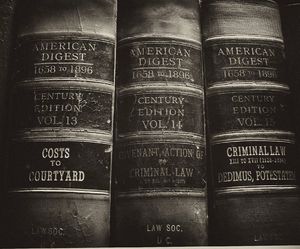Going beyond national legal histories
By Kristopher A. Nelson
in
November 2010
600 words / 3 min.
Tweet
Share
“Lived history,” writes Bender, “is embedded in a plenitude of narratives. … [O]ver time, different themes or concepts, different narratives, will be deemed significant and emphasized” (page 1). The “plenitude of narratives” is formed by the stories historians tell about the past, by people at the time speaking and living their own experiences, by groups (ethnicities, races, classes, nations, cities) sharing common understandings, and is thus never simple nor unitary.
Please note that this post is from 2010. Evaluate with care and in light of later events.
 “Lived history,” writes Bender, “is embedded in a plenitude of narratives. … [O]ver time, different themes or concepts, different narratives, will be deemed significant and emphasized” (page 1). The “plenitude of narratives” is formed by the stories historians tell about the past, by people at the time speaking and living their own experiences, by groups (ethnicities, races, classes, nations, cities) sharing common understandings, and is thus never simple nor unitary.
“Lived history,” writes Bender, “is embedded in a plenitude of narratives. … [O]ver time, different themes or concepts, different narratives, will be deemed significant and emphasized” (page 1). The “plenitude of narratives” is formed by the stories historians tell about the past, by people at the time speaking and living their own experiences, by groups (ethnicities, races, classes, nations, cities) sharing common understandings, and is thus never simple nor unitary.
So far, my legal research tends to focus on a national narrative, and is an attempt to capture a sense of the national consciousness (“expectations of privacy,” for example) of various times. Ideally, though, while I still intend to pretend I can capture some sense of this national sense (if only for appearances sake), I would like to narrow into just a few of stories within the “plenitude of narratives,” and give the stories of the people involved in the actual cases that helped set the national legal landscape (which will serve as stand-in, albeit a distorted one, for the national consciousness). And although American law is framed as a national standard, I nonetheless am aware that “we are part of abroad.”
I mean this in numerous senses. First, the impact of law does not end at a political border, even if its technical jurisdiction might. Other countries receive the influence of American lawmaking and, in turn (and despite itself, in some cases), American law is influenced by foreign law. This influence could be relatively direct (judges borrowing logic and decisions from abroad, an especially common occurrence in early American law, when English decisions were still often looked to regularly). It could also be more indirect: plaintiffs or defendants could be immigrants, technologies could have been developed elsewhere, or “foreign agents” (i.e., spies!) may be involved. Regardless of the reason, American law is never entirely American–although here as much as anywhere this fiction is maintained, both within the legal community and, as Bender suggests, in American historiography. As he points out, though, its critical to rethink this “bifurcation” between the “international” and the United States, for without that undoing, “one has only the most distorted notion of the national history of the United States and very little historical foundation for understanding the contemporary relationship of the Unites States to transnational and global developments” (see Bender again, on page 6).
Saying this, though, is often easier that doing it, especially when looking at legal history–American jurists are often (with some exceptions, especially in regards to early English law) careful to excise outside influences or matters from their written decisions, and often decisions are, in effect, “sanitized” versions of the case or controversy. Focusing on the “micro-history” of a case and on the individual players may be one method of access–at the very least because so many Americans are immigrants–or somehow otherwise distinct from the unitary fiction of “American.” (Kelly’s point on p. 125 about the citizenship status of African Americans pre-14th Amendment speaks clearly to this in terms of one group within the United States).
Another approach that may be fruitful would be to compare and contrast at least one other nation with a different legal tradition to the United States to see how law was developed and applied in that context, and to use that to expand beyond a purely nationalistic discourse. A variation on this approach would be to look at England or Canada, nations with very similar legal systems to the Unites States, and see how they dealt with similar issues.

